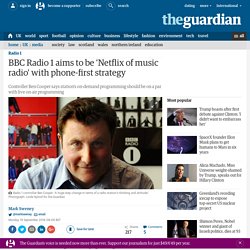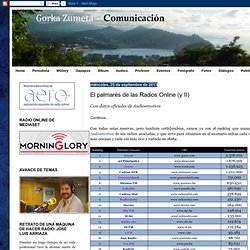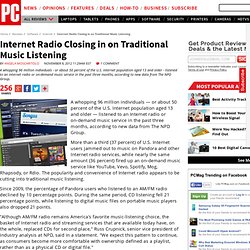

BIAC18 0. Egostreaming - Audiencia Radio por Internet - Estudio consumo de radio online. BBC Radio 1 aims to be 'Netflix of music radio' with phone-first strategy. BBC Radio 1 is aiming to become the “Netflix of music radio” with a new strategy that starts with commissioning 25 hours of programming that will be made available on demand.

Ben Cooper, the controller of Radio 1 and Radio 1 Xtra, believes radio needs to take a leaf out of the hugely successful US streaming service’s book by making content available to listeners when they want it and not tie all output to the broadcast schedule. “We have 25 hours of programming that is made for your phone,” said Cooper, “The reason for this is I believe going forward Radio 1 should have curated on-demand programming on a par with live on-air programming.” Cooper referred to it as a “phone-first” strategy that will allow Radio 1 fans to pick a show to stream or download and listen to when they want, such as on a journey to or from work.
“I want the production team thinking just as much about the on-demand, phone-first programming as they are about the live radio programme,” he said. v16n1a06. Estudio sobre el consumo de Radio Online 2014. Desde el pasado mes de enero, Egostreaming ha estado recabando datos estadísticos sobre el panorama actual de las emisoras de radio por Internet.

Para ello, hemos realizado una encuesta a 10.500 usuarios actívos que escuchan emisoras de radio online. La muestra recoge datos interesantes sobre las preferencias actuales y sobre el comportamiento de los oyentes. Y por fin, tenemos los resultados que hoy compartimos con todo el mundo. En base a una muestra total de 10.500 oyentes habituales de emisoras de radio online, estos han sido algunos de los resultados más importantes a las preguntas que realizamos. La guerra de los mundos, 75 aniversario, interpretado por las mejores voces de la radio española. Gorka Zumeta - Comunicación: El palmarés de las Radios Online (y II) Con datos oficiales de Audioemotion Continúa...

Con todas estas reservas, pero también certidumbres, vamos ya con el ranking que maneja Audioemotionde sus radios asociadas, y que sirve para situarnos en el escenario online cada vez más cercano y cada vez más rico y variado en oferta: Fuente: Audioemotion, junio 2013 Seguro que la primera observación que puede hacer el lector es qué tienen que ver la Cadena SER e Ivoox, por ejemplo, desde el punto de vista del concepto “radio”. Si atendemos a un criterio restrictivo, Ivoox no sería propiamente radio. Llama la atención la convivencia de emisoras analógicas y nativas de internet.
Goear encabeza el ranking con mucha distancia con respecto al segundo. Ivoox es un enorme contenedor de archivos de audio, que funciona a modo de una antigua fonoteca. Groovershark combina el soporte del audio con una red social propia y la música como gran atractivo y sus cifras son más que respetables. Pro Music : All You Need To Know About Getting Music On The Internet. Free Music with Neverending Playlist. 5 Companies That Will Define The Future Of Radio. Radio will never be the same.

Like books, magazines, music and just about every other mass medium you can think of, the age-old format is being transformed by the Internet, mobile technology and a few very smart organizations. We don't know exactly what radio will look like in 20 years (or if we'll even still call it that), but it's safe bet that it would it be utterly unrecognizable by the likes of Edwin H. Armstrong, who was awarded the patent for FM radio in 1933. We'll always have audio, but transmission via radio waves will be augmented by wireless Internet standards like 4G mobile broadband and Wi-Fi.
Those networks will carry much more interactive and smarter audio content, which will likely push traditional broadcasters toward a more personalized experience. So who's forging this future? Stitcher Radio Stitcher Radio is amazing. Pandora For my money, Pandora's Music Genome Project still provides some of the smartest semi-automated music recommendations out there. Spotify. Internet Radio Closing in on Traditional Music Listening. A whopping 96 million individuals — or about 50 percent of the U.S.

Internet population aged 13 and older — listened to an Internet radio or on-demand music service in the past three months, according to new data from The NPD Group. More than a third (37 percent) of U.S. Internet users jammed out to music on Pandora and other Internet radio services, while nearly the same amount (36 percent) fired up an on-demand music service like YouTube, Vevo, Spotify, Mog, Rhapsody, or Rdio.
The popularity and convenience of Internet radio appears to be cutting into traditional music listening. Since 2009, the percentage of Pandora users who listened to an AM/FM radio declined by 10 percentage points. "Although AM/FM radio remains America's favorite music-listening choice, the basket of Internet radio and streaming services that are available today have, on the whole, replaced CDs for second place," Russ Crupnick, senior vice president of industry analysis at NPD, said in a statement.